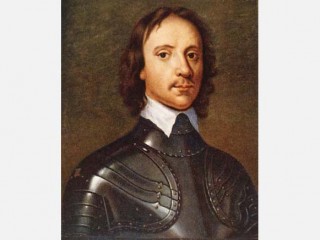
General Oliver Cromwell biography
Date of birth : 1599-04-25
Date of death : 1658-09-03
Birthplace : Huntingdon, England
Nationality : British
Category : Politics
Last modified : 2010-05-25
Credited as : Political and military leader, Lord Protector of England,
He was one of the commanders of the New Model Army which defeated the royalists in the English Civil War. After the execution of King Charles I in 1649, Cromwell dominated the short-lived Commonwealth of England, conquered Ireland and Scotland, and ruled as Lord Protector from 1653 until his death from malaria in 1658.
Rising to become the Lord Protector of both Great Britain and Ireland, Oliver Cromwell brought new perspectives to the government and people he ruled. While he never abused his power, he wanted what he thought would help England regain its international fervor and acclaim in the commonwealth. He longed for the day that his country would be a government truly represented by the people.
Oliver Cromwell came from a wealthy family with prominent connections throughout the land. His father was even known as the “Golden Knight” and his mother was the daughter of a nobleman. Cromwell’s father didn’t send him to receive private schooling, but attended public school with the other boys in his district. One of his schoolmasters, known as Dr. Beard, a staunch Calvinist in his day, was one of Cromwell’s most influential mentors while growing up.
Around 1617, while Oliver was attending Sussex at Cambridge, his father passed away and Oliver left school. In the early 1920s, he began a life with Elizabeth Bourchier, the daughter of a wealthy leather merchant. Cromwell lived in Huntingdon, where he was known by the locals as someone quite modest and willing to help the poor. Cromwell decided later to enter the Parliament for Cambridge around 1640 due to the king enforcing laws that were stressing landowners financially. Furthermore, England was now going to war with Scotland. Although he wasn’t the group’s most prominent official, he voiced his opinions about the reform of the Church and that the king was not undertaking his duties with the will of the people in mind.
By the time war broke out, Cromwell began heading military regiments to defend East Anglia. He was a skillful leader and was able to keep his army of men together, healthy and trained. During each battle, he felt that God was truly behind him, his men and their cause. Even though many wanted the war to end, Cromwell kept his men fighting battles that would strengthen Britain’s control over each region. During the several years of battle against the royalists, Cromwell had become famous at home and abroad.
Oliver Cromwell led other battles over the next few years. When the royalists attempted once more to overthrow the military, Cromwell and his men destroyed the uprising, which eventually led to the execution of Charles I. By 1650, Cromwell had risen to chief of the military and thereafter claimed himself the ruler of England. He was tired of the nothingness that came out of parliamentary meetings and attempted to form a new parliament, which failed. He tried again to bring Council of State together to begin putting together a new constitution, which was never fully agreed upon. Again, Cromwell was forced to dissolve the parliament. Due to these failures, he decided to make the government more militaristic than he had planned. He was later offered the crown as the new King of England, but refused and instead decided he would rather receive the title of Lord Protector, which brought back the House of Lords. Although still devotedly religious throughout his leadership, he attempted to distribute power back to the people where their new constitution would allow prosperity and growth never before seen in Britain.
Monuments
* In Westminster Abbey the site of Cromwell’s burial was marked, during the 19th century, by a floor stone, laid in what is now the Air Force Chapel, reading THE BURIAL PLACE OF OLIVER CROMWELL 1658–1661
* In 1875, a statue of Cromwell by Matthew Noble was erected in Manchester outside the cathedral, a gift to the city by Mrs Abel Heywood in memory of her first husband. It was the first such large-scale statue to be erected in the open anywhere in England and was a realistic likeness, based on the painting by Peter Lely and showing Cromwell in battledress with drawn sword and leather body armour. The statue was unpopular with the local Conservatives and with the large Irish immigrant population alike. When Queen Victoria was invited to open the new Manchester Town Hall, she is alleged to have consented on condition that the statue of Cromwell be removed. The statue remained, Victoria declined, and the Town Hall was opened by the Lord Mayor. During the 1980s the statue was more appropriately relocated outside Wythenshawe Hall, which had been occupied by Cromwell and his troops.
* During the 1890s plans to erect a statue of Cromwell outside Parliament caused considerable controversy. Pressure from the Irish Nationalist Party forced the withdrawal of a motion to seek public funding for the project and eventually it was funded privately by Lord Rosebery. In 2008 the statue was restored to mark the 350th anniversary of Cromwell’s death.
* A statue of Cromwell also stands outside The Academy in Bridge Street, Warrington, an historic building which is now home to the Warrington Guardian newspaper. Cromwell fought the battle of Warrington Bridge against Scottish Royalists in the town in 1648.
* As First Lord of the Admiralty before the First World War, Winston Churchill suggested naming a British battleship HMS Oliver Cromwell. The suggestion did not meet with royal approval.
* In 1940 “Cromwell” was the codeword warning that German invasion of Britain was imminent.
* A steam locomotive built by British Railways, 70013 Oliver Cromwell was named after Cromwell.
















